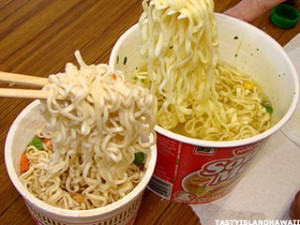
Stereotypically, college students are trying to balance school work and a social life while also trying to maintain a functioning sleep schedule and a decent diet. Ramen noodles seem to be essential to the college lifestyle due to the easy accessibility, cheap cost, and convenience to make a meal in under 5 minutes. Before I came to college my parents bought me an entire package of cup noodles to bring to campus. My mom cautiously warned me that I shouldn’t eat them too often due to the negative impact of my health. I couldn’t quite understand what she meant by that. Even though ramen noodles are the miracle food for college students can it lead to any health risks if we continue to have this in our diets? I know that ramen noodles aren’t the healthiest or organic food to have for a meal, but how detrimental can it be?
Upon my mom’s warning, I decided to look up what ramen noodles consists of and the health risks that follow. Avery Stone for the Huffington Post shares this video on her article to inform her readers about how ramen noodles are made. She makes a disclaimer that the Sun Noodles company produces and manufactures fresh noodles rather than the dry noodles you can buy in the grocery store. Although they’re different, the ingredients are pretty much the same, salt, water and the dough. Upon my research, I came across this article that uncovers a health phenomena that arose while studying the consumption of ramen noodles and health risks like. There haven’t been a wide variety of studies done on the correlation of the noodles to health. But according to Dr. Hyun Joon Shin who studied this association, he discovered that people of South Korea who ate any variation of ramen noodles more often suffered from metabolic syndrome. The epidemic was that the citizens were getting noticeably fatter and the heart disease rate was higher than ever.
The observational experiment Dr. Shin conducted with data from over 10,000 South Korean adults lead to that discovery. Also according to the study women who eat ramen noodles suffered the most from metabolic syndrome. But interesting association they discovered is even the women who have poor diets overall without instant noodles are less likely to be impacted by metabolic syndrome.
Another article I found described a study on the deconstruction of ramen noodles compared to homemade noodles, (including other food items). The study was conducted by Stefani Bardin(teacher at The New School) and Dr. Braden Kuo. They gave their subjects three unhealthy food items one day and three healthier options on another to see how they would decompose in the stomach. The researchers used a video recording capsule which the subjects will swallow to see what happens to the food in their stomachs. After recovering the video many people said it grossed them out and now they’re going to try and avoid eating ramen noodles. This Ted Talk shows a lot about the study. According to this article, it says that Ramen noodles contain a lot of sodium and transfer which can lead to type 2 diabetes etc.
Overall, the study was done in South Korea only shows a certain demographic. I wonder if the study was done to Americans in a different age group etc. Even though the studies found an association to different health problems a lot of those problems could be due to chance, and third confounding variables like genetic issues etc. If you’re a college student or any person who enjoys a cup of noodles here and there take this information with what you will.
Sources:
https://www.thestreet.com/story/12945986/1/ramen-noodles-may-be-bad-for-your-health.html

The price we pay for affordable college food. But yuck. I’ve always felt gross after eating Ramen, but now I definitely will be avoiding it in the future. according to my google search https://www.google.com/search?sourceid=chrome-psyapi2&ion=1&espv=2&ie=UTF-8&q=salt%20content%20in%20ramen%20noodles&oq=salt%20content%20in%20ramen&rlz=1CATAAB_enUS646US646&aqs=chrome.0.0j69i57j0.8951j0j7 there is 875 mg of salt in a packet of Ramen noodles, and according to various health professionals its recommended that humans intake no more than 1500 mg a day. Gross to think you could have more than half of that in one meal